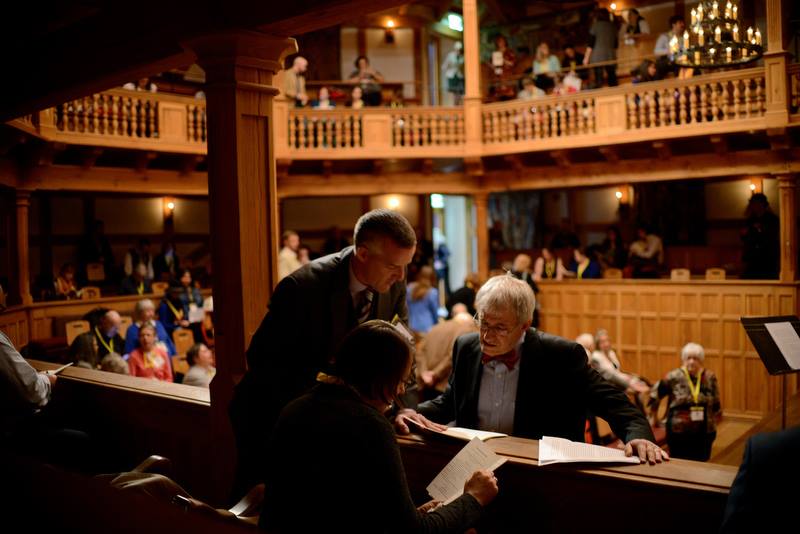There’s a danger in academia, and in theatrical practice, of sometimes letting yourself get into an echo chamber. When you live and work with so many people who are all focused towards the same mission, its easy to feed off of each other’s brains and lose sight of other perspectives. This, I think, is the main reason we have conferences. (The other reason, so far as I can tell, is that it’s beneficial to one’s sanity to realize that, no, you aren’t the only one crazy enough to care with fervid passion about the placement of stage directions or punctuation marks). Leaving our home base and trekking to far-off climes can reinvigorate our own studies and pedagogical practices. Sometimes, getting out introduces new concepts. Sometimes, it reminds me that — yes, I do think the way I think for a reason, and I’m sticking to it. Both experiences are valuable.
This spring has given me a lot of opportunity along those lines. In April, Sarah and I went to Vancouver for the Shakespeare Association of America conference, an annual gathering of hundreds of scholars and graduate students from the US and beyond. The conversation is large and robust, a mix of the venerable and best-known scholars with the up-and-comers. Each year, particularly among the young guard, there’s more conversation about digital approaches to Shakespeare, about community outreach, and about how Shakespeare speaks to different diverse populations. It’s great to know that so many people are so invested in using new technology and opportunities to breathe continual life into the plays we’ve all loved for so long.
The trouble with such an enormous conference, though, is that you can often feel like you’ve missed out on a lot. There are only a few plenary presentations, and a dozen or more seminars run concurrently. I’m grateful for the thriving conference hashtag — widely proclaimed the best on Twitter — #shakeass15. Tweeting sessions not only helps me take notes for myself, it puts me in conversation with other scholars and students with similar interests — and following the hashtag helps me know what I’ve missed due to scheduling conflicts. It’s nice to have a sense of what everyone’s working on, even if I can’t get all the details. Just knowing what conversations are ongoing is an important awareness.
By contrast, the Halved Heart Academic Conference at Shakespeare’s Globe was an intimate affair. A dozen presenters, two keynotes, and an audience of roughly forty scholars and students, all focused on a single topic: friendship in early modern drama. Because of the tight focus of the conference, we all came in with even more of a shared vocabulary than early modernists typically have. There are few other places, I think, where references to Cicero, Erasmus, and Montaigne could get thrown out quite so casually, with such little footnoting. While being at a large conference can sometimes leave me feeling a bit at sea, that communal focus at Halved Heart helped me to feel immediately part of a group, welcomed and warmed. A small conference is, by its nature, exclusive, though. We shared ideas passionately and with brilliant conversation, but it’ll be harder for those ideas to keep propagating. (We had a hashtag there, too: #HalvedHeartConf, if you’d like to see what we were on about). We can each bring what we learned back to our home institutions, and I’ve made some wonderful friends I look forward to connecting with in the future, but it’s just naturally more of a closed loop than a larger conference.
In October, we’ll welcome a few hundred scholars and students to the Blackfriars Conference. We hope to strike a happy balance between the broad-reaching topics and the intimate, friendly atmosphere. Towards that end, most of our sessions are plenary. While a large conference might have only six to eight papers with no competing programming, the Blackfriars Conference has sixty-six. This allows for a wonderful exchange of ideas, where everyone gets to hear the same papers and join in the conversation. But then we also have our colloquy sessions, each focused on a single topic, to further the detailed conversations and to encourage scholars with similar research interests to connect with each other. (And yes, we’ve got an official conference hashtag, too! Follow #BFConf15 for updates as we organize and for information from the conference itself once October rolls around).
All of these conferences serve different purposes, and they’re all great in their own ways. I’m definitely looking forward to SAA 2016 in New Orleans, one of my favorite cities in the world; I hope I’ll be able to head back to London (another favorite city) for another Globe conference sometime; I look forward to welcoming all our friends to our home, here in the beautiful Shenandoah Valley.
–Cass Morris
Academic Resources Manager


